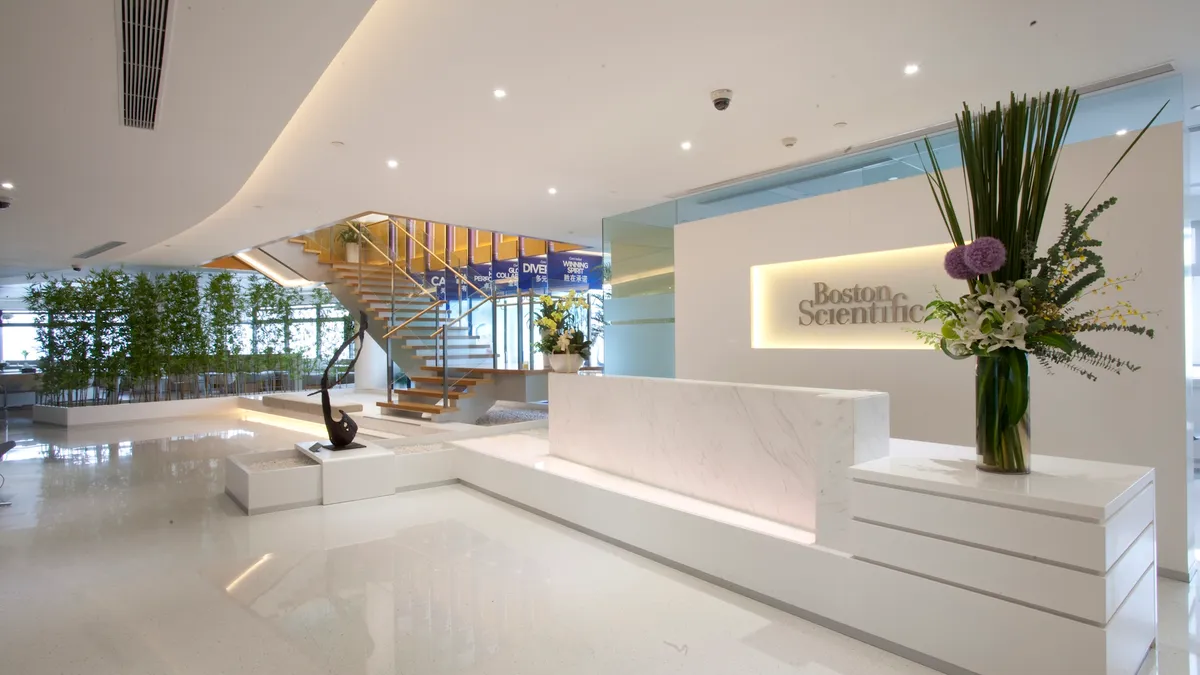Dive Brief:
- Boston Scientific grew organic sales by 5.9% in the first quarter of 2021 to $2.75 billion, beating the previous guidance range between negative 3% and 3% in the quarter due to the pressures from the coronavirus pandemic.
- The giant is the latest medtech to report better-than-expected elective care return in the quarter. CEO Mike Mahoney told investors Wednesday the company expects a stronger recovery in the second quarter and "more normal procedure levels in the second-half of 2021."
- J.P. Morgan analysts wrote that after a tough 2020, results were "another step in the right direction as Boston works to rebuild investor trust and returns to its old beat and raise pattern." Shares rose 4.65% Wednesday morning.
Dive Insight:
The return of elective or non-essential procedures, which drives lucrative business lines for procedure-dependent medtechs, has been a top trend coming out of first-quarter earnings calls. Johnson & Johnson, Edwards Lifesciences, Philips and others have all reported a somewhat surprising rebound to procedures in March after volumes dropped throughout the winter.
J&J CEO Alex Gorsky said procedure volumes had even grown above pre-pandemic levels in certain markets.
The industry-wide rebound signals a possible return to pre-pandemic volumes in the second half of 2021, which both analysts and industry have projected.
Boston Scientific was one of the hardest-hit medical device companies last year as procedure volumes fell off, reporting an 11.3% organic sales decline in 2020 compared to 2019.
Mahoney during Wednesday's call said the recovery can be seen in some of the company's business lines more susceptible to the effects of the pandemic, such as urology and neuromodulation. The CEO said the segments saw a "significant improvement" in March, after December volume declines continued throughout the first months of the year.
Much like other medtechs, Boston Scientific's recovery in the quarter varied by geography. The U.S., Asia-Pacific and Middle East and Africa regions had stronger returns than Europe, for example, as countries like Italy have instituted lockdown measures, according to Mahoney.
Still, the CEO said the European business grew above 2019 levels and expects the region to gradually return throughout the year as vaccination numbers increase.
Along with growth over the first quarter of 2020, which saw an up to $40 million COVID-19 hit, Boston Scientific grew revenue 3% above the same period in 2019.
J.P. Morgan analysts highlighted the interventional cardiology and cardiac rhythm management businesses as growth drivers in the quarter, beating their expectations by $65 million and $30 million, respectively.
The company raised its full-year guidance. Organic revenue growth for 2021 is now expected to come in at 15% to 18% above 2020 results and 2% to 5% above 2019, an increase of the lower end of the ranges by roughly 2% to 3%.
Boston Scientific has been active on the M&A front to begin 2021 despite the pandemic. The company purchased Lumenis' global surgical business for $1.07 billion in March and bought up cardiac wearables company Preventice Solutions for $925 million in January.
Mahoney said Boston Scientific is still "very bullish" on the Preventice deal even though Medicare rates for extended external holter use were slashed by roughly $200 earlier in April. The CEO said that Preventice has a more diverse array of cardiac monitoring products and not reliant on long-term services.
However, Mahoney did acknowledge during an earnings call in February that the long-term space is a fast-growing submarket and makes up 10% to 15% of Preventice's business.
CFO Daniel Brennan hinted that with $2 billion in cash remaining, the company may continue to spend later in the year.
"We have the appetite, and we have the balance sheet in place to continue to do that," Brennan said. "And that feels like maybe one or two more of those tuck-in acquisitions that we could get done here in 2021."











